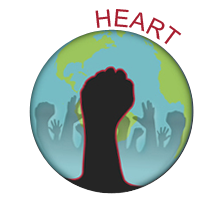
HEART
Law of the Heart makes a case for a consciousness-centered, global movement that is rising under the media radar and taking over the planet. For the first time in history, independent communities and movements are taking a stand for their rights and dignity. It is the autonomy of the Zapatistas in Mexico, the land occupation of Movimiento Sem Terra in Brazil, the social-economic power of the undocumented immigrant movement in Europe, the indigenous liberation movements of the Mapuche in Chile, the Palestinian nonviolent resistance in Bil’in, the people-generated new constitution in Bolivia, the dignity of the Indignados in Spain, the 99% of the Occupation Movement in the US, and the inspiration of the Arab Spring; all rising up and bringing a revolution of values in every continent and country.
This movement is unique to human history; driven by a vision of social justice, dignity, reverence for life and nonviolence—it has no leaders and no centralized authority. It is this ‘bottom-up’ horizontal structure that not only generates direct democratic decision-making, but also makes the movement resilient against its adversaries. It cannot be decapitated because it has as many leaders as members. As the title of the film indicates, this movement does not pledge allegiance to a nation, a religion or a leader, but rather to the calling of the heart.
The models of autonomous communities which Law of the Heart documents came into being as the people's response to the Free Trade Agreements, Globalization, and austerity plans of Neo-Liberalism. Unlike liberation movements of the past, the resistance to the exploitation of people and environment did not emerge out of political doctrine, ideology or “isms,” but rather, it materialized through the daily struggle of communities for a better life; a life that espouses to promote dignity, justice and sustainability.
Law of the Heart is a leading voice in a new wave of progressive films that document activism that is for rather than against something, and depicts the solution rather than the problem. Unlike films such as The 11th Hour, The End of Poverty, and An Inconvenient Truth, Law of the Heart is not a warning about what we should be doing in order to make this world a better place, but rather, the film documents what we already are doing, revealing the world of tomorrow today.
As a film, Law of the Heart affirms to millions of people that they are not alone: their organization is not alone, their community is not alone, and their vision of a world that works for all of its inhabitants is not alone. The film shows clearly that times have changed and that change has come.
“And so, I felt that there is a strong distinction between God's law and man's law, between the law that is written in my heart since the day I was born and the law that is written on papers that changes from time to time depending on the politicians, and depending on the lobbyists, and depending on how our people push.”
